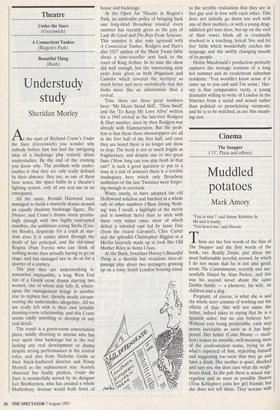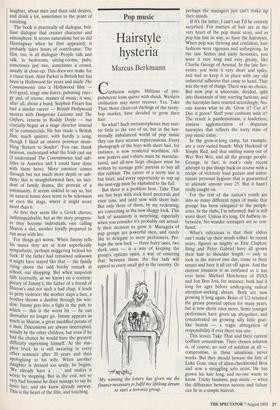Cinema
The Snapper (15', Plaza and others)
Muddled potatoes
Mark Amory
`You're wha'?' said Jimmy Rabbitte Sr. He said it loudly.
`You heard me,' said Sharon.
These are the first words of the film of The Snapper and the first words of the book, too. Roddy Doyle, just about the most fashionable novelist around, by which I do not mean that he is not also good, wrote The Commitments, recently and suc- cessfully filmed by Alan Parker, and this was his second novel about the same Dublin family — a plasterer, his wife, six children and a dog. Pregnant, of course, is what she is and the whole story consists of working out the effects of that. She will not name the father, indeed takes to saying that he is a Spanish sailor, but no one believes her. Without ever being predictable, each step seems inevitable as soon as it has hap- pened. Her father (Colm Meany — excel- lent) makes an amiable, well-meaning mess of the confrontation scene, trying to do what's expected of him, repeating himself and suggesting too soon that they go and have a drink. Her mother is quiet, shocked and says yes, she does care what the neigh- bours think. In the pub there is sexual seg- regation and as soon as possible Sharon (Tina Kellegher) joins her girl friends; but she does not tell them. They scream with
laughter, about men and their odd desires, and drink a lot, sometimes to the point of vomiting.
The book is practically all dialogue, bril- liant dialogue that creates character and atmosphere. It seems naturalistic but so did Hemingway when he first appeared; it probably takes hours of contrivance. The film; too, is all dialogue. People talk and talk, in bedrooms, sitting-rooms, pubs, sometimes just two, sometimes a crowd, usually in close-up. This does not make for a visual feast. Alan Parker is British but has been in Hollywood for years and made The Commitments into a Hollywood film feel-good, zingy one-liners, pulsating ener- gy and, of course, masses of music; it was, after all, about a band. Stephen Frears has had a similar career — British Hollywood success with Dangerous Liaisons and The Grifiers, returns to Roddy Doyle — but crucially began as a stage director instead of in commercials. He has made a British film, much quieter, with hardly a song, though I liked an unseen postman mum- bling 'Return to Sender'. You can, thank heavens, understand what the Irish cast say (I understand The Commitments had sub- titles in America and I could have done with them here). More emotion comes through but not much more depth or sub- tlety; this is straightforward fare, an inci- dent of family drama, the portrait of a community. It seems unkind to say so, but its natural home does seem to be television or even the stage, where it might score more than 6.
At first they seem like a Greek chorus, indistinguishable, but as the story progress- es they become individuals, one calling Sharon a slut, another loyally prepared to run away with her.
For things get worse. When Jimmy tells his mates they are at least superficially sympathetic, perhaps sniggering behind his back. If the father had remained unknown it might have stayed like that — the family rising above the odd bitchy remark at school, out shopping. But when suspicion falls (correctly, as we know) on a contem- porary of Jimmy's, the father of a friend of Sharon's and not such a bad chap, it leads to petty violence: the mother slaps a face, a brother throws a dustbin through his win- dow, Jimmy gets into a fight in the pub, to which — this is the worst bit — he can thereafter no longer go. Jimmy appears as much as Sharon, a great muddled potato of a man. Discussions are always interrupted, usually by the other children, but even if he had the chance he would have the greatest difficulty expressing himself. At the sim- plest level, he is still swearing in every Other sentence after 20 years and then apologising to his wife. When another daughter is dressed too sexily, he begins, We already have a . . . ' and makes it worse by stopping. But in the end, not so very bad because he does manage to say he loves her and she knew already anyway. This is the heart of the film, and touching.



















































 Previous page
Previous page